Cop dramas dominate television. On any given night, a major network like NBC (where cop dramas are ubiquitous), has a primetime television lineup that is packed with shows like Chicago PD. Not to mention, there are countless spin-off television shows that have spawned from the existing cop dramas, including other genre shows- like sci-fi fantasy- that have some aspect of cop drama embedded within them, i.e. Grimm.
Why so many?
The short answer is, of course, that they’re successful. And, as a result, the networks will continue to produce that which gives them an economic advantage over their competitors. Makes sense; no one goes into business without the intention of making money. But then too, there is the obvious factor that people innately love drama, and in case you’ve never see any one of these cop dramas, they are filled with it. It doesn’t matter if it’s the classic case of “who done it?” or the interest is of a more salacious nature, millions of people- like you and me- loyally tune into these shows from week to week. The question is: what are they getting from these shows? Even further, what needs are these shows fulfilling?
Justice
Whether you grew up reading comics or watching more plain clothes heroes in the movies or on the small screen, we’re all embedded with imagery of the importance of justice being served from an early age. Cops epitomize justice. Well, the good ones anyway! Cops are uniformed heroes, out for justice….and the American way. As a result, we root for them to catch the bad guy, whatever the cost and by whatever means necessary. This is fine by us when we’re watching on the small screen, but not in real life, of course. It’s about getting justice in an unjust world.
Cop dramas on television fulfill that need in us to see justice carried out. In the process of it all, however, we allow ourselves to sometimes endure the most gruesome or traumatizing stories, because we’re holding out for the satiating moment at the end when justice is served. As rewarding as this may be, it forces the huge audience of loyal followers that watch these cop dramas, to gain more and more insight into the underbelly of our society, potentially increasing the likelihood of a growing tolerance for or desensitization towards violence in the process.
Power
Cops have an undeniable sense of power that results from their line of work. This in turn enables them to carry out their job. Sometimes they use it for good, and sometimes they don’t. Either way, it makes for good entertainment on the small screen in the form of cop dramas.
When we watch these cop dramas, we as the audience get to live vicariously through the cops, which for some may be a stimulating form of escapism. No surprise there; isn’t that the point of most television programming anyway? The only difference, however, between cop dramas and other forms of realistic dramatic programming, is the existence of power and the major role it plays in aiding police officers on the job; something we all in some fashion aspire to.
Power, in and of itself, is very tempting to almost anyone. That makes sense. No one wants to be powerless for fear of what that may bring about. However, if you do have the power in a situation, there is a greater sense of certainty that you will in fact be able to exercise more control over your fate. Cop dramas exemplify this as even the desk clerks or beat cops on these shows have more power that you and I. We may not personally agree with the cops course of actions- although the writers on these show are smart enough to build sympathetic plot lines in favor of the cops- or maybe we do agree, but the point is that we know that the cops have the power and can exercise it at any given moment and that has a dramatic allure to it. The only problem with this is when law enforcement has too much power. Even on television, absolute power corrupts absolutely.

